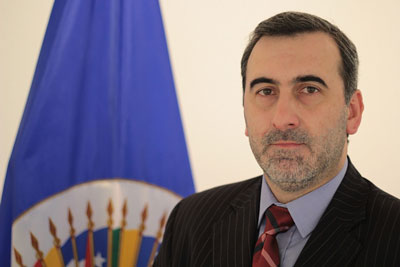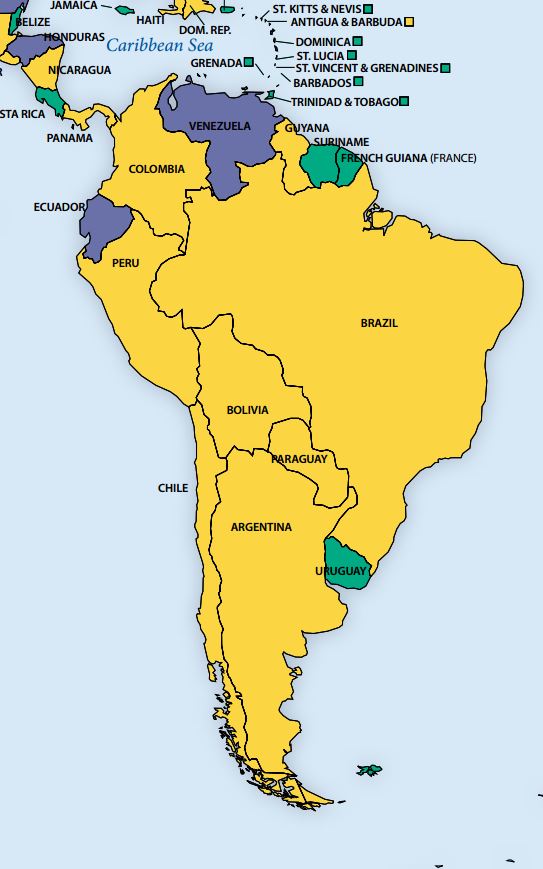
Edison Lanza (Inter-American Commission on Human Rights)
On the eve of his appointment as the new Special Rapporteur for Freedom of Expression of The Inter-American Commission on Human Rights, Uruguayan lawyer, journalist and director of CAinfo, Edison Lanza, visited CIMA to discuss the success of Uruguay’s media reform efforts in a region plagued by little regulation and limited respect for freedom of expression and independent media.
In the 30 years since its emergence from military dictatorship in 1984, Uruguay has quietly become something of a poster child for democratic reform in Latin America, and its record on media is no exception.
Consistently ranked at the top of the region by the major media freedom indices for the past decade, Uruguay has created an increasingly supportive environment for media through the passage of reforms targeting community radio, libel laws, and freedom of information, as well as pending legislation on broadcast licensing and regulation.

Uruguay has set itself apart from much of its neighborhood according to Freedom House’s 2014 Freedom of the Press Map.
In a country run by a military regime up until the mid-1980s, how was the media environment transformed in such a profound way, whereas many of its neighbors have languished in the yellows and purples of the Freedom House 2014 Press Freedom Map? Although the laws themselves warrant discussion as models for the region, too little attention is paid to the way in which these laws came to fruition.
Lanza credits Uruguay’s improved media environment to the formation of broad-based civil society coalitions in the 1990s. The coalitions, sometimes encompassing up to 30 diverse organizations each, leveraged the technical expertise of their members and focused on specific media issues such as freedom of expression or community radio where they could galvanize the most public support. Perhaps more crucially, the coalitions conducted strategic outreach to members of the national general assembly. Since the enabling environment for media necessitates political support, cultivating political allies is key to the success of any reform movement.
However, forming political alliances can be a persistent challenge for media reform advocates, according to Lanza. “The problem is on both sides, civil society and government, but we tried to convinced people that all sectors should be involved in media reform. But it can be hard to have a constructive dialogue.”
In Uruguay, media coalitions succeeded early on in finding political support among left-wing politicians in the opposition that were particularly sensitive to human rights issues and saw media and freedom of expression as part of that effort. These political allies provided a strong voice within Uruguay’s lawmaking body and allowed media reform bills to be authored, introduced, and advocated for from within the political system even if they stood little chance of passing.
In 2005, after years of sustained efforts, media reform advocates like Lanza had their golden political opportunity with the emergence of the left-wing Broad Front coalition in the national assembly. Their political allies in congress now had real political clout to pursue reform. Only a few years later, Uruguay would pass landmark laws on community radio, libel, and freedom of information. “When the [Broad Front] came to power, we were able to say, ok now this is your chance to pass the reforms you have been talking about for years.”
In a recent post on The Source, author Richard Winfield of the International Senior Lawyers Project strongly argues in favor of focusing more media development interventions on helping to shape the enabling environment for media. Indeed, donors and implementers should look to support indigenous movements like the one described in Uruguay to create an enabling environment for media. This means supporting coalition-building among domestic organizations, providing needed technical assistance and understanding the political realities in the country in order to build sufficient political institutional support. The Uruguayan example demonstrates that organized, collective, and sustained support for media reform can succeed. International media development actors, especially donors and implementers, must find a way to support these efforts.
*Thank you to Silvio Waisbord of the George Washington University for his contribution to this post. Dr. Waisbord has written extensively about “media movements” in Uruguay, as well as other media issues in Latin America. Read more in his article “The pragmatic politics of media reform: Media movements and coalition-building in Latin America”.

Comments (0)